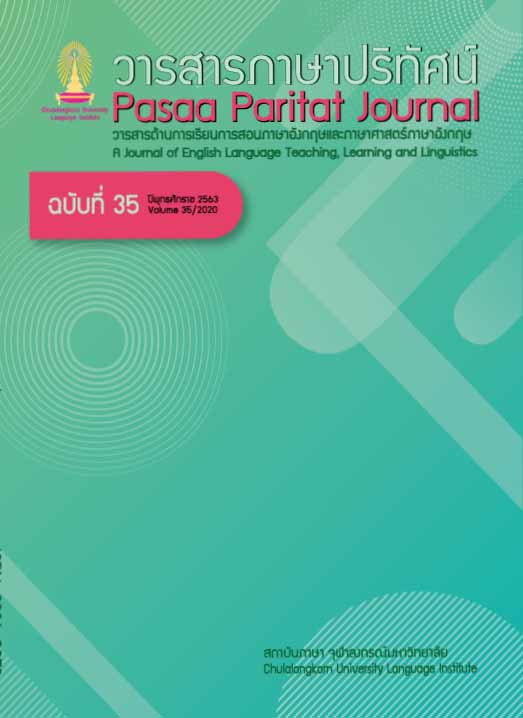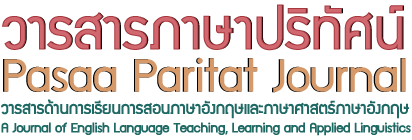Integrating approaches to analyzing English e-mail correspondence in an import-export business
คำสำคัญ:
business English, emails, turn-taking, speech acts, interactional metadiscourseบทคัดย่อ
It has been suggested that skills in email communication be incorporated into pedagogy, but one problem in achieving this is the paucity of studies of business emails. This research reports findings from a corpusbased analysis of business email negotiations, conducted as a case study. The study explores turn-taking patterns, speech acts and interactional metadiscourse markers in a case of business negotiation via emails to observe the dynamics of business interaction and buyer-seller relationships which vary across time and stages throughout the course of e-negotiations. Findings reveal the one-to-one turn taking pattern at the in-business negotiation phase where important decisions are made, but when problems occur both parties cooperate as can be seen in many-to-many turn taking patterns in the final shipping phase. Representative, directive and expressive acts conveyed by the seller prevail those used by the buyer during the initial contact, but later the buyer seems to express several types of speech acts more frequently.Engagement and attitude markers are used most frequently in the middle stage of the negotiation when the business relationship is critical while selfmentions are preferred in the final shipping stage which aims at solving problems. Business English learners should be made aware of the interactional linguistic features available in the English language and be given a chance to exercise them. Ideas on teaching business interactional discourse are suggested in the discussion.
เอกสารอ้างอิง
Ädel, A. (2006). Metadiscourse in L1 and L2 English. Amsterdam: John Benjamins.
Alyousef, H. S. (2015). An investigation of metadiscourse features in international postgraduate business students’ texts: The use of
interactive and interactional markers in tertiary multimodal finance texts. Sage open Journal, Oct-Dec, 1-10.Bargiela-Chiappini, F., Chakorn, O., Lay, G. C. C., Jung, Y., Kong, K. C. C., Tanaka,
S. N. H. (2007). Eastern voices: Enriching on communication in business: A forum. Discourse & Communication 1(2), 131-152.
Biber, D., Conrad, S. & Reppen, R. (1998). Corpus linguistics: investigating language structure and use. Cambridge: Cambridge University Press.
Biber, D., Johansson, S., Leech, S., Conrad, S. & Finegan, E. (1999). Longman grammar of spoken and written English. Essex: Longman.
Bjørge, A. K. (2007). Power distance in English lingua franca email communication. International journal of Applied Linguistics 17(1): 60-80.
Brown, P. & Levinson, S. C. (1987). Politeness: Some universals in language usage. Cambridge: Cambridge University Press.
Bülow, A. M. (2009). Negotiation studies. In F. Bargiela-Chiappini (Ed.), The Handbook of Business Discourse (pp. 142-154). Edinburgh: Edinburgh University Press.
Carrió-Pastora, M. & Calderón, R. (2015). Precedia – Social and behavioral sciences 173, 214-221.
Carter, R. & McCarthy, M. (2006). Cambridge grammar of English. Cambridge: Cambridge University Press.
Chakorn, O. (2006). Persuasive and politeness strategies in cross-cultural letters of request in the Thai business context. Journal of Asian Pacific Communication (special issues), 16(1): 103-46.
Charles, M. (1996). Business negotiations: Interdependence between discourse and the business relationship. English for Specific Purposes, 15(1): 19-36.
Cho, H. & Yoon, H. (2013). A corpus-assisted comparative genre analysis of corporate earnings calls between Korean and native-English speakers.English for specific purposes, 32, 170-185.
Cohen, L., Manion, L. & Morrison, K. (2011). Research Methods in Education.London: Routledge.
Collins, K. (2008). Exploring Business. New York: Pearson Prentice Hall.Dignen, B. & McMaster, I. (2013). Effective International Business Communication.London: Collins.
Dressen-Hammouda, D. (2012). Ethnographic approaches in ESP. In B. Paltridge& S. Starfield (Eds.), The handbook of English for specific purposes (pp.501-518). Oxford: Wiley-Blackwell.
Emmerson, P. (2013). Email English. London: Macmillan.
ดาวน์โหลด
เผยแพร่แล้ว
เวอร์ชัน
- 2020-04-07 (2)
- 2021-01-04 (1)
รูปแบบการอ้างอิง
ฉบับ
ประเภทบทความ
สัญญาอนุญาต

อนุญาตภายใต้เงื่อนไข Creative Commons Attribution-NonCommercial-NoDerivatives 4.0 International License.



